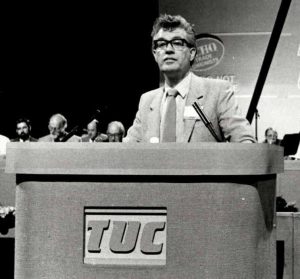 Rodney said he believed in a form of hierarchy but only to ensure things got done. He gave his officers at both national and regional level a great deal of freedom, within Union policy constraints, to pursue their responsibilities.
Rodney said he believed in a form of hierarchy but only to ensure things got done. He gave his officers at both national and regional level a great deal of freedom, within Union policy constraints, to pursue their responsibilities.
He quickly developed a progressive reputation within the wider movement. In 1984, he was elected to chair the TUC Public Services Committee. That same year he was approached by Moss Evans of the TGWU and Clive Jenkins of ASTMS to stand for election as General Secretary of the TUC. He declined to do so saying he was committed to serving the membership of NUPE.
His growing reputation was further exemplified by his election as Chair of the TUC Economic Committee in 1986. Receiving letters of congratulations from colleagues on the General Council he responded by saying, “hold onto the congratulations until after September as there is a move afoot to have me out”.
The Financial Times picked this up and ran a story stating the ‘right wing’ would have him out at Congress in September as they claimed ‘he could be a liability when seeking the election of a Labour Government’.
Not only was he re-elected to the Chair but at that TUC Congress he successfully moved the resolution calling for a Statutory National Minimum Wage mirroring his success at the Labour Party Conference in 1985.
The opposition to his motion at Congress came from the EETPU and the TGWU. Ron Todd told Rodney afterwards that he was not opposed to the concept of a statutory minimum wage but was concerned that “like gravity, the wages of other workers could fall to that level”. The EETPU opposition was directed towards maintaining differentials between their skilled members and various other grades of workers.
He was a tireless campaigner and, beside providing inspirational leadership in his own Union, he was prominent in supporting the miners’ strike in 1984 and regularly attending and speaking at the Durham Miners’ gala. The print unions were universal in their praise for his, and the union’s, support during the Wapping dispute with Murdoch’s News International.
Internationally, he was President of EPSIC/EPSU from 1991 to 1996 and Vice-President of Public Services International (PSI). Together with Carola Fischbach-Pytell, EPSIC/EPSU’s General Secretary, he oversaw the difficult transition from EPSIC as an industry committee of the ETUC to a fully fledged European Public Services Union (EPSU) capable of interacting with the European Union and employer organisations at the highest levels. Nearing retirement Carola wrote the history of EPSU and dedicated it to Rodney’s memory.
Among his many other activities he supported the Traveller community and was a Patron of the Dalit Solidarity Network, campaigning on behalf of the so called Untouchables sorely discriminated against in the Indian sub-continent and elsewhere. More stories on these and others in the archive.
Looking to the future he, together with close colleagues, saw a need for bringing public sector unions together and opened up conversations with COHSE and NALGO in particular.
Biography by Jim Sutherland
Next > Towards a New Union I Biography index
